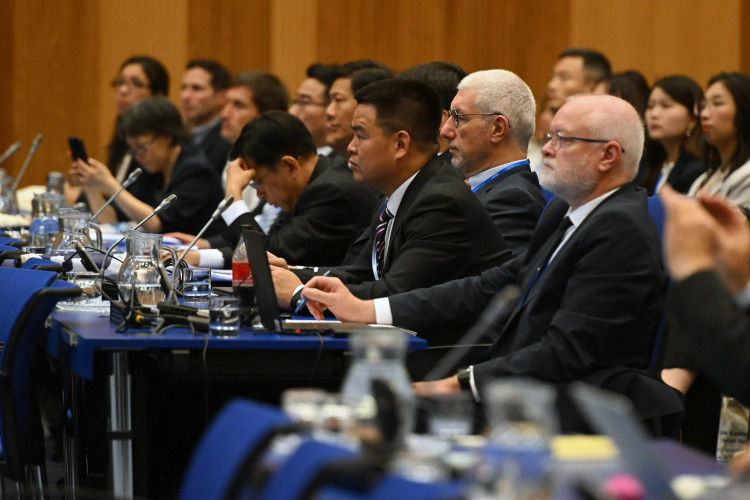Proactive talent development and strong international cooperation are key pillars of the long-term success of the nuclear industry, participants heard at the International Conference on Nuclear Knowledge Management and Human Resources Development in Vienna earlier this month.
Nuclear power is a clean energy source offering potential to decarbonize the energy, transportation and industrial sectors. In the historic first Global Stocktake under the Paris Agreement approved at COP28 in Dubai, the 198 signatory countries to the UN Framework Convention on Climate Change called for accelerating the deployment of low-emission energy technologies, including nuclear power, for deep and rapid decarbonization, particularly in hard-to-abate sectors such as industry.
The IAEA foresees nuclear capacity more than doubling by 2050 in the high case scenario, and the Agency also projects there will be more than 4 million professionals supporting the nuclear power industry by 2050. But about one-third of the existing workforce is expected to retire by 2033, and upwards of one million new workers will be needed to replace those retiring and support the rollout of additional nuclear capacity. For nuclear power's viability to endure well into the future, robust knowledge management and human resource development practices are needed.
"The nuclear industry is evolving and the demand for well-trained, highly competent employees is growing," said Mikhail Chudakov, Deputy Director General and Head of the IAEA Department of Nuclear Energy. "It is critical that we identify and develop talented individuals so that they may become valued assets to their teams for years to come. And we must pursue development approaches that centre diversity and inclusion, and not only because this is the equitable thing to do, but also because innovation thrives when more people are given opportunities." Knowledge management, transfer and retention practices must continue to be developed and implemented in order to maximize the sustainability of the industry, he added.
The conference, held from 1-5 July at the IAEA's Vienna headquarters, had more than 760 registrants from 108 countries and 9 invited organizations. Throughout the week, panel sessions and side events were held on topics including leadership development, technology innovation and stakeholder engagement, as well as challenges in and strategies for human resource development. The five teams behind the winning entries selected in the proSTEM Challenge, a competition inviting ideas and outreach projects from students and young professionals on attracting and developing the new generation of workforce in STEM-related specialities, were invited to attend the conference and received certificates during one of the side events.
"We must leverage our technological advancements, align with the values of the younger generation, engage students early, offer competitive compensation and provide dynamic career opportunities," said Elsie Pule, HR Executive for South Africa's Eskom Holdings Soc Ltd and conference president. "By doing so, we will secure the talent necessary to drive our industry forward and contribute to a sustainable future."

More than 700 people from over 100 countries registered for the International Conference on Nuclear Knowledge Management and Human Resources Development. (Photo: Dean Calma/IAEA)
"The IAEA supports Member States at every stage of their capacity building efforts with a comprehensive yearly programme of services and missions dedicated to helping improve their capabilities in nuclear knowledge management, human resource development and nuclear education," said Pedro Dieguez Porras, head of the IAEA's Nuclear Knowledge Management Section and co-scientific secretary of the conference.
These initiatives include the Nuclear Knowledge Management (NKM) school, a one-week course providing specialized education and training on how to implement nuclear knowledge management programmes in nuclear science and technology organizations, including key organizations for nuclear programme implementation and decision making.
As of February 2024, 1,139 professionals have been trained through IAEA NKM schools. Earlier this year, Australia hosted its first NKM school at the University of Adelaide's Centre for Radiation Research, Education and Innovation, and four more schools are planned for 2024.
The Agency also assists countries in the drafting of human resource development plans, with an expert mission last May to Poland's Polskie Elektrownie Jądrowe assessing their preparedness to meet human resource needs ahead of plans to deploy significant nuclear power capacity in the coming years. Other assistance includes the Nuclear Energy Management (NEM) school, a course designed to develop leaders in the nuclear energy field, and the International Nuclear Management Academy, an initiative developed to support universities in establishing and delivering master's degree programmes in various areas of nuclear technology management.
Increasing the number of women in the nuclear field is a major priority, and the IAEA has made significant progress in this area. The Maria Sklodowska-Curie Fellowship Programme, launched in 2020, provides young women around the world with scholarships towards master's degrees in the nuclear sector. As of July 2024, the programme has supported 560 women from 121 countries with scholarships. And the Lise Meitner Programme, which kicked off in 2022, provides early- and mid-career women with opportunities to take part in visiting professional programmes designed to advance their skills.
Key takeaways from the conference included the need to build strong partnerships among global organizations and the importance of reaching out to students early on, including by offering interesting student projects such as the proSTEM challenge, considering the competition faced from other industries.
"Effective knowledge management ensures that critical information, expertise, and best practices are preserved and transferred across generations, preventing knowledge loss and enhancing operational safety and efficiency. Human resource development, through continuous education and training, equips professionals with the necessary skills to adapt to technological advancements and regulatory changes, fostering innovation and maintaining high safety standards," said Kim Pringle, Director of Human Capacity Building at Saudi Arabia's King Abdullah City for Atomic and Renewable Energy and co-vice president of the conference. "Together, they ensure the industry remains resilient, safe, and capable of meeting future energy demands and this conference facilitated a collaborative and engaging environment to achieve this goal."






